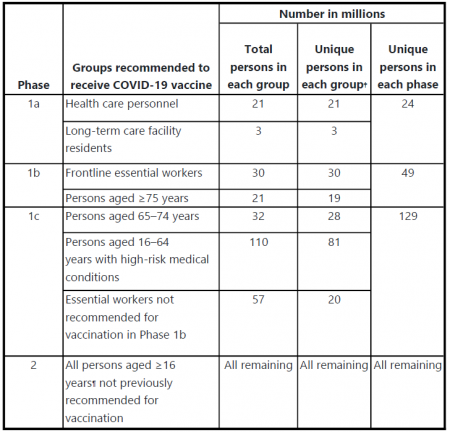
COVID-19 wrought havoc on America’s economy in 2020, but the new year and new vaccines are bringing new hopes for return to normal in 2021.
However, Iowa experts have two messages for business leaders who are looking over the horizon and anxiously awaiting their shots: Start planning now, and be prepared for things to change.
Ken Sharp, division director for Acute Disease Prevention, Emergency Response, and Environmental Health at the Iowa Department of Public Health, said Iowa manufacturers are classified as 1B on the federal government’s priority list for who will get access to a COVID-19 vaccine – just ahead of other “essential workers” in transportation, construction, and food service. But it may be February or March until Iowa has enough vaccine to get to that place on the line.
“It is just such a moving target,” Sharp said at the end of December. “All of these estimates have to be footnoted and asterisked like crazy, because chances are they will change.”
In the meantime, business leaders should start planning immediately on how they’re going to handle a vaccine:
Can you require your employees to get it?
Generally, yes, said Kelsey Knowles, an attorney with the Belin McCormick law firm in Des Moines. However, any such policy must allow for exceptions such as medical recommendations against the vaccine and sincerely held religious beliefs. If a particular employee is pregnant or allergic to vaccine components, doctors may advise against taking it at this time.
What will that mean?
“If employers are contemplating a mandatory vaccine policy, I think they really need to think through what they are going to do if people say no,” Knowles said. “What are they going to do if people object?”
Companies will be required to make reasonable accommodations for people whose beliefs and/or medical status won’t allow them to get vaccinated, she said. That may mean allowing them to work from home or in separate, more socially distant conditions. The key is going to be thinking through – and documenting – exactly what is required to perform each particular job and how that might impact an employee’s need to get vaccinated.
Mike Ralston, president of the Iowa Association of Business and Industry, urges all manufacturers to review job descriptions and employee manuals to make sure that they match the duties and responsibilities that actually need to be fulfilled in a post-pandemic world. For instance, is traveling really a key part of performing a certain role? Is that something that should require vaccination?
“Then your employee manual ought to say that,” Ralston said. “If it doesn’t say that, it should.”
And what about the shots?
Sharp, of the IDPH, said state officials will be allocating vaccine weekly based on the amount available, that week’s current priority population for getting the vaccine, and the percentage of those people in each county. State officials will learn how much is available, allocate that to county health departments, then work with federal authorities to get vaccine shipped directly to county-chosen locations.
Temperature requirements will be factored into those decisions, Sharp said. IDPH already has identified the roughly 40 locations in Iowa that are capable of handling the Pfizer vaccine and its need to be kept at a temperature of -94° F.
Nothing will be shipped to a location where it can’t be used, he said. “The logistical nightmare is on us in terms of making sure we get product where it can be handled easily and in a timely enough fashion.”
Iowa businesses with an interest in vaccines should work with county health departments to make their needs known and determine the best way to get shots to the people who need them. Considerations should include:
- Do you want to refer employees to a local hospital or clinic? (Potentially even one run by the county health department?)
- Should you contract with a third-party provider to run a clinic on-site?
- Companies with their own medical personnel on staff still will need to enroll as a vaccine provider to get shots directly.
- Each decision may come with different requirements for notification, record keeping, etc.
“Companies certainly ought to be thinking now about the logistics of how they’re going to vaccinate their employees,” Ralston said. “You really want to make sure you’ve got everything figured out.”
Of course, you should be prepared to figure it out again.
Sharp said a state advisory board is still working on future priorities for how vaccines should be used. By the time it becomes available, businesses should have more guidance about how different roles and risk factors should be prioritized in doling out available shots.
For now, “take a deep breath,” Sharp said. “We’re working on making the best resources available. Everybody will get their turn.”
Does this mean you can stop taking employee temperatures and remove the Plexiglas shields from your factory?
No, experts say. Definitely not. Most people are still months away from getting vaccinated, and nobody knows for certain what to expect.
“We’ve encouraged people not to even be thinking about ending their mitigation measures right now,” Ralston said. “Even after vaccinations, you’re going to want to keep some of that in place for a while, and I don’t know what the definition of ‘a while’ is.”
For more information about dealing with the coronavirus, visit https://www.ciras.iastate.edu/covid-19/.
Posted: 1/5/21